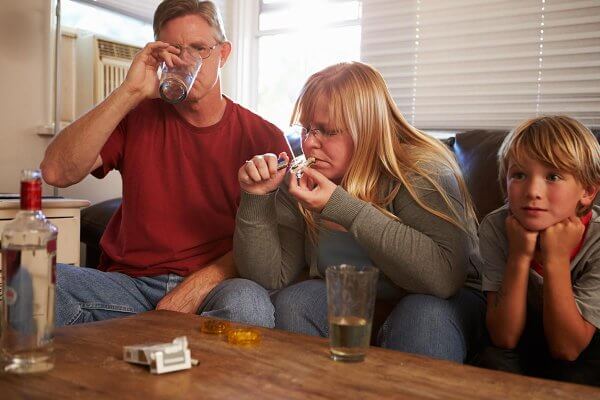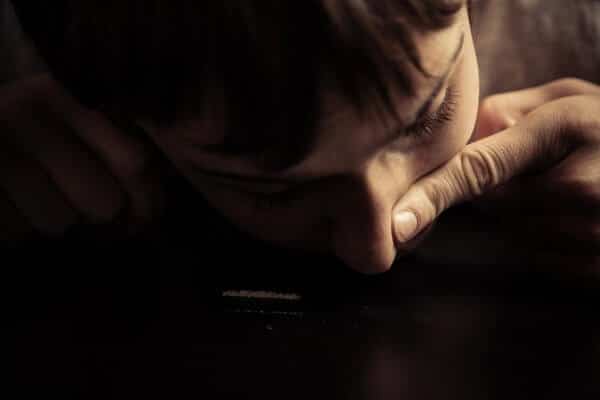When a Child and Parent Share an Addiction

More than 24 million Americans suffer from some form of substance use disorder, and as a result, nearly 25% of children are exposed to substance abusers and addicts at least once during their childhood. These children then go on to become more prone to developing addictions themselves, either as a means of coping, lashing out at parents who weren’t there because of a substance, or because it’s ‘what they know’.
The result is often a cycle of addiction, which continues from parent to child, sometimes while both are addicted, sometimes while both are in the same home, and sometimes years apart.
No matter the circumstance, instances in which both children and their parents are addicted require extensive family therapy and rehabilitation, because both addictions often play off the other, enabling each other, and causing stress and family strife that push the other addict back into using.
How Exposure to Substance Abuse Affects Children

Children are often the most vulnerable party in any situation where someone is an addict. Because children are still developing, often in a situation of dependency on the addict, and completely reliant on their parents for behavioral and emotional guidance, having a substance abuser as a parent can severely impact personal development in ways that go on to affect the rest of their lives.
Parents who are dependent on substances are often emotionally withdrawn, can be manipulative, and can be abusive, even when they don’t realize it. Children raised by addicts are also more likely to experience physical abuse and unwarranted anger. All of this results in long-term trauma, which in a child, produces physical changes in the brain, affecting the child’s decision making, emotional regulation, and behavior modulation. Children exposed to trauma such as a parent with a substance use disorder are nearly 50% likely to develop their own problems with substance use.
This is typically measured using the Adverse Childhood Experiences scale, which was developed based on a study of more than 17,000 adults and children. The ACE study directly maps a person’s likelihood to be susceptible to drug and alcohol addictions, as well as physical diseases and psychological disorders, based on childhood trauma. In a follow-up study of over 8,000 adults, adverse experiences were mapped to a direct increase in likelihood to become addicted, starting from age 13.
So, children with addicted parents are significantly likely to become addicts themselves. This can eventually arrange itself into multiple family relationships:
- Parent and child are both using
- Parent is in recovery and child is using
- Parent relapses and child is in recovery
- Parent and child relapse
- Parent and child enable each other
- Parent and child have no relationship and use substances to cope
Each of these relationships can create extremely different family dynamics, which effect how and why they can go into treatment.
Enabling Behavior
In some cases, both parent and child addicts can enable each other by continuing their addictions side-by-side. This is especially important in single-parent households, where a teen or young adult is reliant on an addict or recovering addict, and both parties are willing to deny or overlook the other’s substance abuse to continue their own.
This also often occurs when parents who are in recovery learn of their child’s substance abuse. Guilt, or being guilted by the child, can push a recovering parent into believing that the addiction is their fault, and therefore they have no place to say or do anything about it. As a result, parents in this situation may lie, cover up for their child, or hide their addiction, therefore enabling it to continue.
Because enabling behavior can make it more difficult for each party to accept responsibility for their own addiction, it can be extremely harmful because it means that it will take longer for either parent or child to move into rehab.
Honest Communication
While no one likes to claim responsibility or culpability for hurting someone else, addiction can cause you to unknowingly hurt the people in your life. A parent who is an addict must often bring themselves to the point of recognizing where they have made mistakes so that they can communicate and talk to their child. Approaching a child with honesty, genuine guilt, and remorse can be the only way to reconnect.
Programs like Alateen are often useful for creating settings and situations in which both the child and the parent can talk to each other. For example, Alateen works to offer support, create a confidential setting, and encourage teens to cope with their parent’s substance abuse – and often to talk to them.
Getting Help Together
Family therapy, where both the parent and the child, seek out treatment and then go into therapy and counseling together is the best solution for comorbid addictive relationships. While in some cases, children will prefer to cut ties with their addicted parent, seeking out treatment and therapy together can enable both to move past their addiction, get help, and create a new, healthy relationship.
Many treatment centers now offer family therapy to target group problems, to help improve family dynamics and hierarchy, and to build healthy relationships. While you likely cannot go to rehab together, you can attend family therapy during and after the treatment.
This typically involves strategic family therapy, cognitive behavioral therapy, trauma treatment, and solution-focused family therapy.
However, the specific family therapy you take will greatly depend on the age of the participants, your problems, and how many people are attending therapy with you.
MDFT – Multidimensional Family Therapy takes a multi-level approach to therapy, offering in-home and in-office therapy sessions with each member individually and together. Here, sessions work to improve communication skills, decision making, and problem-solving on an individual level, as well as active family interactions, substance abuse, and relationships. This treatment option is most often chosen for adolescents and young teens.
FBT – FBT is a form of cognitive behavioral therapy aimed at families. With a broad approach designed to target substance abuse in teens and parents, as well as in adult families, FBT is highly suitable for treating co-current substance use disorders.
Getting help for a substance use disorder or an addiction is made much more complicated when another family member is currently using as well. Because families enable each other, directly impact each other’s emotional health and stress, and act as an example, any member of your family using can be harmful, even if you are not using yourself.
Whether you are part of a parent/child relationship where substance abuse is involved, or are a third party such as a partner or a sibling, getting both parties into treatment and into family therapy is essential to their long-term recovery. In many cases, because family members enable each other, getting one addict into therapy without the other will eventually result in a relapse, because the relationship problems behind the addiction are still present.
If you or your loved one is struggling with Methamphetamine or in any drug or alcohol addiction, call us today and speak with one of our experienced and professional intake advisors, we’re here to help. Beginnings Treatment Centers is located in beautiful and sunny Southern California in Orange County, which has one of the strongest and most active recovery communities in the United States.

